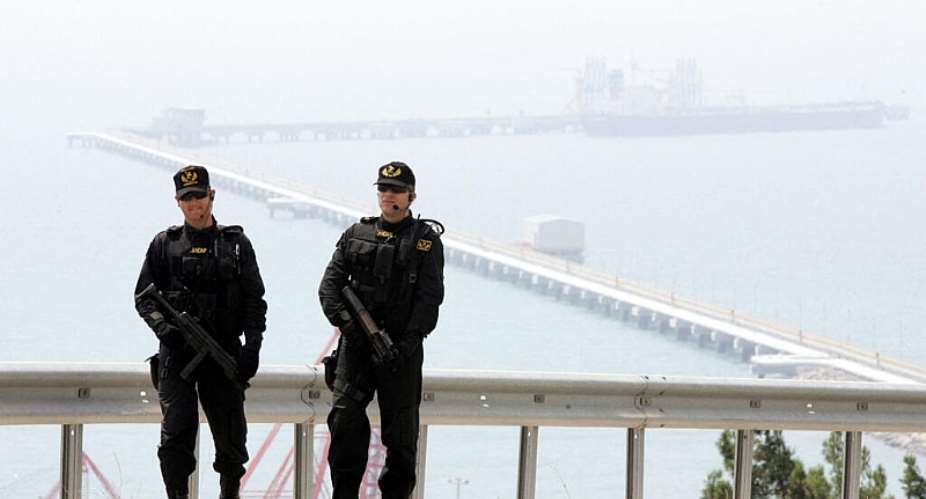With Israeli forces stepping up their assault on the Gaza Strip and Turkish President Recep Tayyip Erdogan continuing to ramp up his rhetoric against the government of Prime Minister Benjamin Netanyahu, Ankara is nonetheless resisting calls to cut off vital oil deliveries to Israel.
Supertankers continue to deliver oil to Israel from the Turkish port of Ceyhan. Oil pipelines from Azerbaijan and Iraqi Kurdistan terminate at the Mediterranean harbour, making Turkey a key oil supplier for Israel.
"The bulk of Israeli oil needs come from either Azerbaijan or Iraqi Kurdistan," says analyst Mehmet Ogutcu of the London Energy Club.
"I think the latest figures show Azerbaijan provides around 40 percent of Israel's oil needs. It comes all the way to Ceyhan, and from Ceyhan, it's sent to an Israeli port where it's moved to one of the refineries," Ogutcu explains.
But with the death toll mounting from Israel's invasion of Gaza, calls for Turkey to cut off oil deliveries are growing.
Iran's foreign minister Hossein Amirabdollahian, speaking with his Turkish counterpart Hakan Fidan in Ankara earlier this month, urged countries delivering oil to Israel to cut their supplies, a call Fidan ignored.
Despite Erdogan ramping up his rhetoric against Israel, oil deliveries from Turkey to Israel continue to flow. And questions remain about how effective any embargo by Turkey would be.
"I don't think that Israel will suffer in any way because oil is plentiful in the world markets," points out Ogutcu. Even if Turkey were to cut off Israel's supply, "they can bring it from Brazil or Canada or from some of the African countries where they have good relations", he says.
"Israeli consumption, if I'm not mistaken, is around 225,000 barrels per day. That's not a significant amount. It can be easily secured either through long-term contracts or on the spot market," he adds.
Talking tough
But Turkey has other ways of harming Israel if it wants to strike a blow.
"Turkey could stop the working of the Kurecik radar station in Malatya in Turkey, which is crucial to the Nato missile defense system, and as far we know, it also protects the airspace of Israel," says Ilhan Uzgel, an international relations expert and columnist for Turkey's Kisa Dalga news portal.
So far Erdogan has not taken any of these options. "What he has to do is please his audience, so he makes tough statements," says Uzel. "It's not hurting anybody; in the end, it's just words."
Erdogan is continuing with his rhetoric against Israel, even describing Hamas as a liberation movement while personally attacking Israeli prime minister Benjamin Netanyahu. But the Turkish leader's actions remain more measured.
Announcing the recall of Turkey's ambassador from Israel for consultations this month, Erdogan stressed that diplomatic relations with Israel would remain open and that Turkish efforts were continuing to seek the release of hostages held by Hamas.
"The rhetoric is harsh, but the concrete actions are not that harsh, at least in terms of the bilateral relationship," observes Galip Dalay, an associate fellow at Chatham House in London.
"I think the idea is that if you burn bridges, you will not be able to play the diplomatic role as much as you hope to."
Attempts at diplomacy
On Monday, US Secretary of State Antony Blinken visited Ankara for the first time since the outbreak of the Israel-Hamas war. In a tacit acknowledgment of Turkey's efforts, Blinken said third-party countries were playing a role in securing the release of the hostages.
Erdogan is expected to join Arab leaders for a summit in Riyadh to discuss the crisis. But Dalay warns there may be limits to Ankara's nuanced approach toward Israel.
"If Turkey is convinced that actually the diplomatic track is not working and if other regional countries, not only Turkey, reach the same conclusion that Israel is not paying any attention to this diplomatic track or call for a ceasefire, then we might see – both at a regional level and a Turkey level – countries taking punitive action," Dalay warns.
With Erdogan's large religious base at the forefront of growing protests against Israel, that will likely add pressure on the Turkish leader to take a harder stance if the violence continues.





 Let’s be true believers, not just church goers – Catholic Priest to Christians
Let’s be true believers, not just church goers – Catholic Priest to Christians
 Ejisu by-election: "We don’t need an independent candidate" — Akufo-Addo fights ...
Ejisu by-election: "We don’t need an independent candidate" — Akufo-Addo fights ...
 Election 2024: Bawumia dares Mahama to two-man debate as he starts countrywide t...
Election 2024: Bawumia dares Mahama to two-man debate as he starts countrywide t...
 'Borla' BVDs: 'Why would anyone want to buy 10 used biometric devices 'hard-code...
'Borla' BVDs: 'Why would anyone want to buy 10 used biometric devices 'hard-code...
 Professor Jane Naana pays last respect to Modestus Ahiable
Professor Jane Naana pays last respect to Modestus Ahiable
 IT is a major skill needed for the job market - Industry Players
IT is a major skill needed for the job market - Industry Players
 Nungua Traditional Council performs “Jenten Nishwamo” ahead of Homowo
Nungua Traditional Council performs “Jenten Nishwamo” ahead of Homowo
 Tema residents demand end of dumsor
Tema residents demand end of dumsor
 A vote for Owusu Aduomi is a vote gor NDC – Bawumia tells Ejisu residents
A vote for Owusu Aduomi is a vote gor NDC – Bawumia tells Ejisu residents
 S. Africa's ex-president Zuma makes surprise comeback
S. Africa's ex-president Zuma makes surprise comeback
